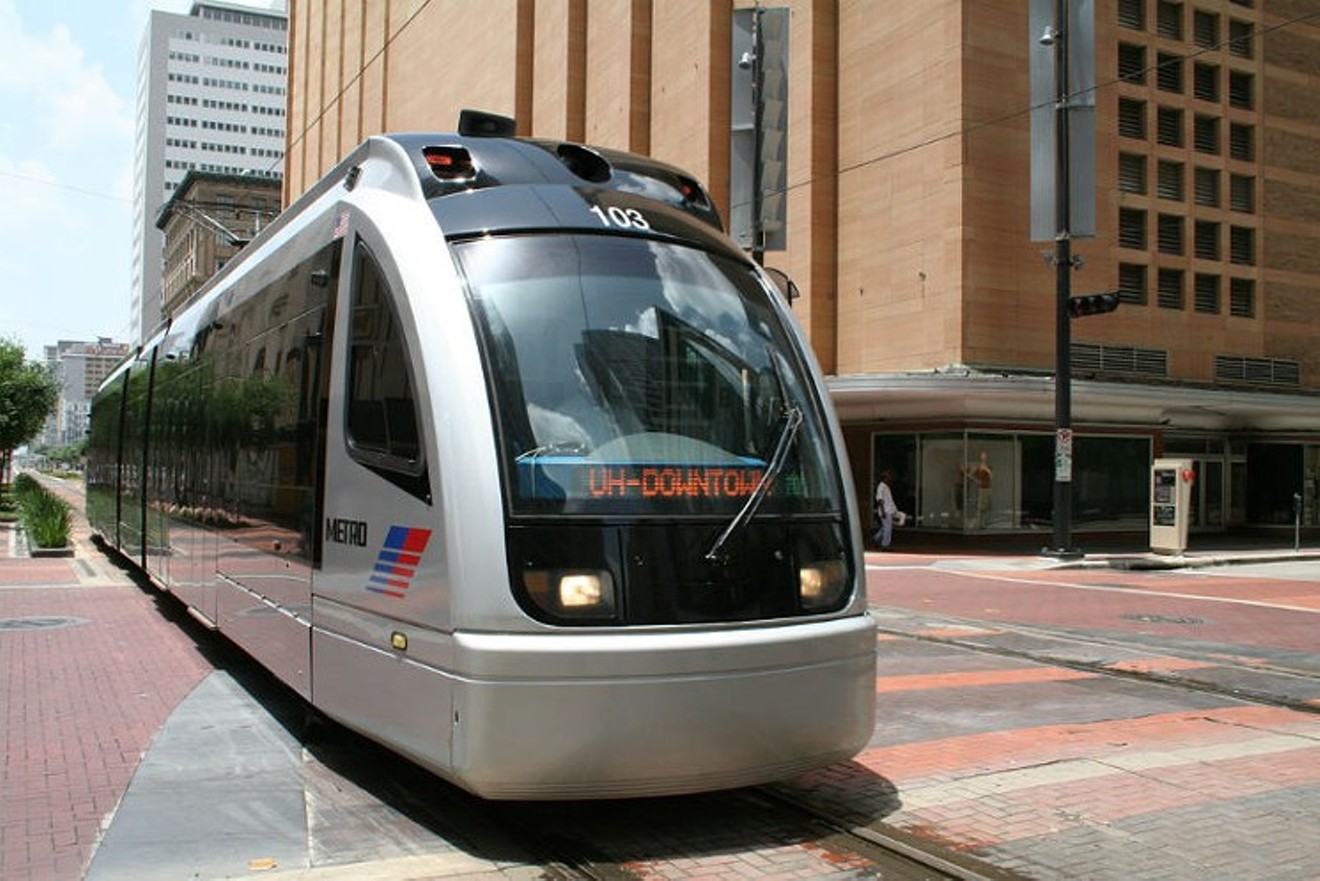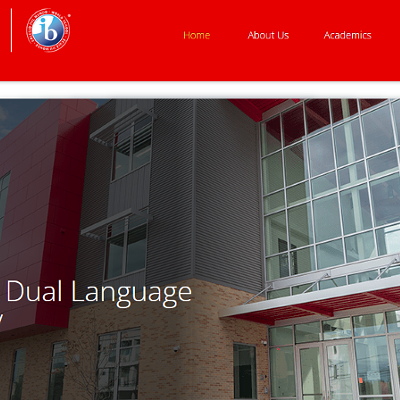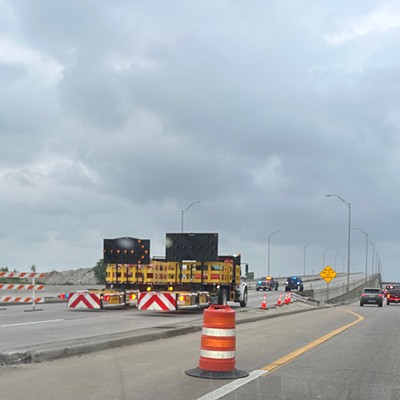METRO has been working on a long-term $7.5 billion plan that will re-shape transit in the Houston area over the next 20 years and it is asking for the input of Houstonians. Funny they should ask, because we've been talking about this sort of thing for quite some time. In fact, we think we have some pretty good suggestions of our own, many of which have been echoed by readers and people we have talked with over many years of covering METRO and transit issues in Houston.
So, METRO, if you are listening, here are five ways you can improve transit, specifically through rail.
Make low income neighborhoods a priority for expanded service options.
Bus service is fine, but rail changes neighborhoods. It bring increased development along the rail lines and decreased crime thanks to the greater visibility of police and better overall lighting. One simple example would be the benefit to neighborhoods like Acres Homes with a light rail line that ran along North Shepherd and, ultimately, north along Veteran's Memorial Drive. It could literally change the landscape of areas along the line while providing convenient access to areas of town for Houstonians who can't afford cars.
Really commit to commuter rail.
And since we are talking about expansion of rail around town, it's time to get serious about commuter rail. It has long been rumored that commuter trains running down the Westpark Tollway and/or Hempstead Highway were on the drawing board. Time to start committing to that for real. Most big cities in America with large suburban populations have options other than Park and Ride to get those folks to business centers.
With more than 605 square miles of area just inside the city limits and hundreds more between there and the suburban centers, the best and most feasible option is commuter rail. It wouldn't be cheap, but Houston is routinely ranked at the bottom of the country in vehicle commute time, nevermind traffic congestion. Think about getting people out of cars in rush hour and onto trains.
Extend the current lines to the airports, like now.
Whenever a discussion about light rail comes up, invariably one of the first things someone will say is, "Why the hell don't we have rail to the airports?" It's a really really good question. Does anyone think the best way to get people from IAH or Hobby is to drive them along freeways littered by car lots and strip malls? Doesn't exactly put the old best foot forward.
Most importantly, there are already rail lines half the way to both locations. The North Line could almost certainly be extended down Airline from its transit hub at Northline Mall out to Aldine Bender before taking a short jog up to the Hardy Toll Road and over Bush, a little over six miles. Hobby is even easier. The current Purple Line ends at the Palm Transit Center, seven miles from Hobby through a heavily industrialized area. A trek along Mykawa to Airport is a straight shot.
Ending these rail lines short of those airports was likely a financial decision, but it wasn't a particularly good one.
Connect the Galleria.
The single greatest impediment to light rail, probably in the entire city but most certainly in Montrose and Uptown, was John Culberson. With his stunning defeat to Lizzie Fletcher last year, there is no excuse not to get the ball rolling on a line that could connect three of the busiest centers of commerce in Houston: downtown, the Medical Center and the Galleria. It wouldn't even be particularly difficult. The plans were laid out and despite complaints from affluent neighbors along Richmond (what, you prefer potholes to rail lines?), there seemed to be strong support from riders for such a plan.
The Galleria is already in the midst of a major overhaul for their compromise on public transit, the rapid bus service along Post Oak (we are still waiting for someone to tell us the insane construction for bus lanes has been clearly worse than what would have been needed for rail lines), but it won't do much more than shuffle people around Uptown unless it has a connector to other services.
Close portions of Main and Fannin to vehicle traffic.
We have harped on this for a long time and we think that there are very legitimate reasons to close down significant portions of Main and Fannin from vehicle traffic, particularly in downtown. First, one portion of downtown is already blocked off and it creates not only a pedestrian-friendly street, but options for retail, something downtown has been trying to jumpstart for decades. Second, it all but eliminates some of the real problems posed by cars and trains traveling in the same direction for miles down a small road. We can't count the number of times we've seen confused drivers in the rail lane when they shouldn't be.
It won't completely end any chance a driver will be hit by or, more likely, hit one of the trains at a crossing point. But it certainly would cut down on it. You can't do this for the entire stretch, but in downtown, maybe in the heart of the Med Center, maybe even in portions of Midtown (near the new park at McGowen up to Alabama, for example), it seems like a way to both cut down on accidents and create more walkable portions of the city, which, quite frankly, is good for everybody.
Support Us
Houston's independent source of
local news and culture
account
- Welcome,
Insider - Login
- My Account
- My Newsletters
- Contribute
- Contact Us
- Sign out

METRO wants suggestions from the public on how to improve transit. We have five right here.
Photo by Ed Schipul via CC
[
{
"name": "Related Stories / Support Us Combo",
"component": "11591218",
"insertPoint": "4",
"requiredCountToDisplay": "4"
},{
"name": "Air - Billboard - Inline Content",
"component": "11591214",
"insertPoint": "2/3",
"requiredCountToDisplay": "7"
},{
"name": "R1 - Beta - Mobile Only",
"component": "12287027",
"insertPoint": "8",
"requiredCountToDisplay": "8"
},{
"name": "Air - MediumRectangle - Inline Content - Mobile Display Size 2",
"component": "11591215",
"insertPoint": "12",
"requiredCountToDisplay": "12"
},{
"name": "Air - MediumRectangle - Inline Content - Mobile Display Size 2",
"component": "11591215",
"insertPoint": "4th",
"startingPoint": "16",
"requiredCountToDisplay": "12"
}
,{
"name": "RevContent - In Article",
"component": "12527128",
"insertPoint": "3/5",
"requiredCountToDisplay": "5"
}
]
KEEP THE HOUSTON PRESS FREE...
Since we started the Houston Press, it has been defined as the free, independent voice of Houston, and we'd like to keep it that way. With local media under siege, it's more important than ever for us to rally support behind funding our local journalism. You can help by participating in our "I Support" program, allowing us to keep offering readers access to our incisive coverage of local news, food and culture with no paywalls.
Jeff Balke is a writer, editor, photographer, tech expert and native Houstonian. He has written for a wide range of publications and co-authored the official 50th anniversary book for the Houston Rockets.
Contact:
Jeff Balke
Trending News
- Dan Patrick Sets Off Alarm Bells For Public School Advocates With His Property Tax Trial Balloon
- Texans DE Will Anderson Among Favorites to Win 2024 Defensive Player of the Year
- Avoid Highway 90 Like the Plague This Week
-
Sponsored Content From: [%sponsoredBy%]
[%title%]

Don't Miss Out
SIGN UP for the latest
news, free stuff and more!
Become a member to support the independent voice of Houston
and help keep the future of the Houston Press FREE
Use of this website constitutes acceptance of our
terms of use,
our cookies policy, and our
privacy policy
The Houston Press may earn a portion of sales from products & services purchased through links on our site from our
affiliate partners.
©2024
Houston Press, LP. All rights reserved.





